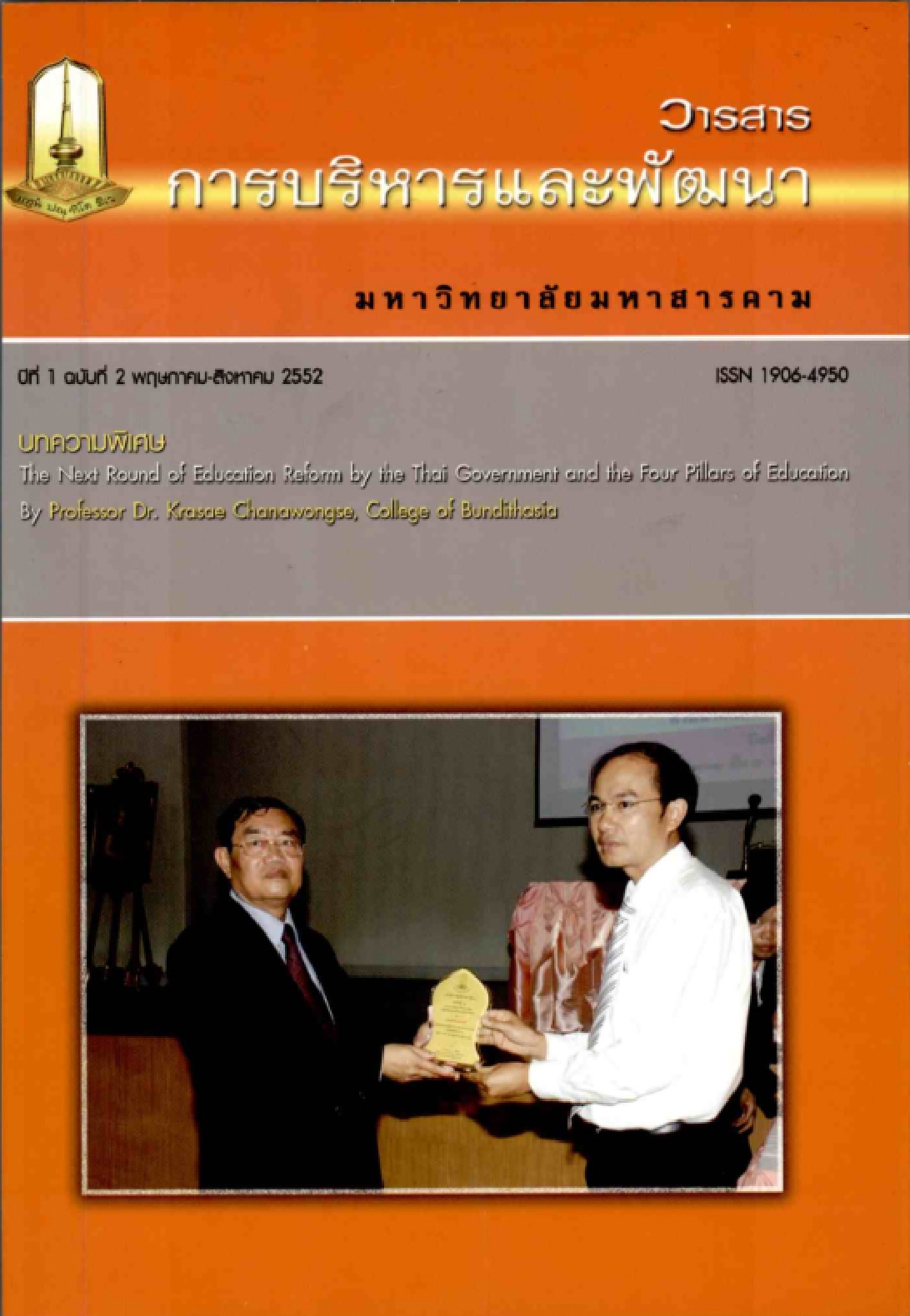Educational Management in a Changing World at the Faculty of Architecture and Planning Thammasat University
Main Article Content
บทคัดย่อ
Education reforms in a changing world arose first against neo-classical education or 'humanistic education.' Its effects forced instructors to teach for testing, changed curriculum standards, and students became academic entrepreneurs. The Faculty of Architecture and Planning at Thammasat University adjusted to these changes. This quantitative research approach focuses on educational management guidelines. The open-ended questionnaire and structural interview are its main instruments. Percentage, mean, mode, standard devia- tion, F-test, and Pearson Correlation were used for analyzing the data. The research finding reveals that the mainstream and the alternative aspects in the educational management guidelines concern with external factors such as the entrepreneurs' satisfaction, standardiza- tion, and the students' voices. The entrepreneurs' satisfaction relates to general qualifications, identifications, and abilities of the graduates selecting between government university and private university at a rate of 3:1. Standardization means new curriculum structure; 25% of general basic courses, 10-15% of elective courses, and 60-65% of architectural program courses. The students' voices indicate a desire to reduce central control and standardized testing.
Downloads
Article Details
เอกสารอ้างอิง
Ashcroft, K and Foreman-Peck, L. (1996). Quality Standards and Reflective Tutor. in Quality
Assurance in Education. West Yorkshire: MCB University Press, 4(4), 17-25.
Brown and Others. (1997). Assessing Student Learning in Higher Education. London: Routledge.
Chamrernrat, Juerjan. (2000). A Development of Academic Performance Indicators in the Private
Universities. Bangkok: Srinakharinwirot University.
Dressel, P.L. (1967). Handbook of Academic Evaluation. San Francisco:Jossey-Bass Pub.
Ellis, R. (1993). Quality Assurance for University Teaching. Buckingham: SRHE & Open University Press.
Miller, R.T. (1974). Evaluating Faculty Performance. San Francisco: Jossey-Bass Pub.
Ministry of Education, Thailand. (1996). Education Reform at the Ministry of Education Thai
land. Bangkok: External Relations Division, Office of the Performance Secretary.
National Center on Education and the Economy. (1989). Retrieved,n.d.from: http://nces.ed.gov/
pubsearch/getpubcats.asp?sid=091
Pornphan Verapreyagura and others. (2007). Entrepreneur's Satisfaction toward the Gradu
ates of the Faculty of Architecture and Planning, Thammasat University.
Prathumthani: Faculty of Architecture and Planning Thammasat University.
(2006).The Development of Instructor Evaluation and Measurement Method of the
Faculty of Architecture for Setting InstructorStandard in Educational Quality Assurance.
Bangkok: Thailand Research Fund (TRF) and Commission of Architecture and Planing
Thammasat University.
(2006). Problems in Selection Procedures for the Faculty of Architecture and Planning:
Student Achievement Comparison between Different Selection Procedures.Prathumthani:
Faculty of Architecture and Planning Thammasat University.
(2004). Architectural Student: Key for Being Entrepreneurial Faculty of Faculty of Architecture, Thammasat University Thailand. PrathumThani: Faculty of Architecture and Planning Thammasat University.
Porter, A.C, and Archbald,D.A. (1994). Educational Evaluation and Policy Analysis,16, 1 (Spring,1994), 21-39.
Ratch Rueng-ut-wiboon. (2006). Towards Quality Improvement of Architects in Responsive to Organization Need. Bangkok: Thammasat University.
Sirichai Karnjanawasri. (1991). A Search for Structure of the Statistical Procedure. Social Science Research. 6,(April 1991), 45-58.
Somwung Pitiyanuwat and Arunsri Anantrasirichai. (2002). Curriculum and Learning Reform in Thailand. Hong Kong: (copy paper,presented at Invitational Curriculum Policy Seminar: School Based Curriculum Renewal for the Knowledge Society Developing Capacity for New Times).
Suthanu Srisai. (1996). Important Indicators for Student's Evaluation, Chulalongkorn University.Bangkok: Chulalongkorn University.
Uthumporn Tong-U-Thai. (1980). Teacher Evaluation: Research and Instrument. Bangkok:Samanmit Printing.


